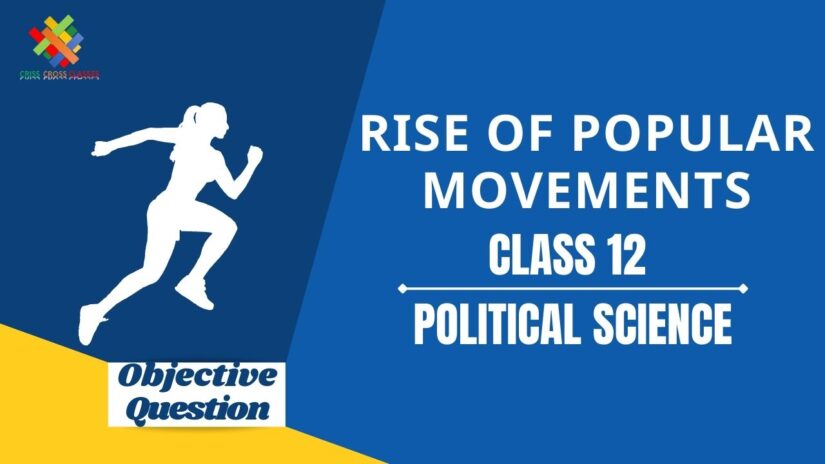Chapter – 7
Rise of Popular Movements
Class 12 Political Science Chapter 7 Rise of Popular Movements Objective Questions in English. These Objective Questions are helpful for the students who are in class 12 and have Political Science. Attempt These Objective Questions to Check your knowledge and the status of your preparation. These Objective Questions are also helpful for the preparation of 1 Mark Questions
| Board | CBSE Board, UP Board, JAC Board, Bihar Board, HBSE Board, UBSE Board, PSEB Board, RBSE Board |
| Textbook | NCERT |
| Class | Class 12 |
| Subject | Political Science |
| Chapter no. | Chapter 7 |
| Chapter Name | Rise of Popular Movements |
| Category | Class 12 Political Science Objective Questions in English |
| Medium | English |
Rise of Popular Movements
Objective Questions in English
- When was the Janata Party government formed?
- In 1974
- In 1977
- in 1980
- In 1983
- When was the Bharatiya Janata Party formed?
- June 25, 1975
- April 6, 1980
- July 25, 1978
- March 6, 1982
- When was Subhash Chandra Bose born?
- On January 23, 1897
- On January 25, 1890
- On January 30, 1897
- None of these
- Which constitutional amendment provided reservation to women in Panchayats?
- 42nd
- 44th
- 65th
- 73rd
- Who was the founder of Bahujan Samaj Party?
- Mayawati
- Ambedkar
- Kashiram
- None of these
- Who was the first Chief Minister of Bihar?
- Anugrah Narayan Singh
- Shri Krishna Sinha
- Karpoori Thakur
- none of these
- Which constitutional amendment gave constitutional status to municipalities?
- 72nd
- 73rd
- 74th
- 75th
- Who was the founder of Jana Sangh?
- Atal Bihari Vajpayee
- Advani
- Shyama Prasad Mukherjee
- Deen Dayal Upadhyay
- Janata Dal (United) belongs to which state party?
- Bihar
- Jharkhand
- Punjab
- Uttar Pradesh
- Which Prime Minister implemented the recommendations of the Mandal Commission?
- VP SIngh
- Atal Bihari Vajpayee
- Indira Gandhi
- Morarji Desai
- When did the Right to Information Act come into force?
- 2001
- 2003
- 2005
- 2007
- Bhakra Nangal Project is situated on which river?
- Ganga
- Kaveri
- Sutlej
- Kaveri
- The Anti-Arrack Movement movement is related to which state?
- Gujarat
- Bihar
- Andhra Pradesh
- Maharashtra
- How many languages are mentioned in the Indian Constitution?
- 22
- 24
- 18
- 25
- Which of the following cannot be classified as a new social movement?
- Chipko movement
- Save Narmada Campaign
- Tehri Dam Movement
- Graha Swaraj Movement
- Where did the Right to Information movement start?
- Rajasthan
- Delhi
- Tamil Nadu
- Bihar
- What percentage of reservation has been demanded for women in the Indian Parliament?
- 25 percent
- 30 percent
- 33 percent
- 35 percent


